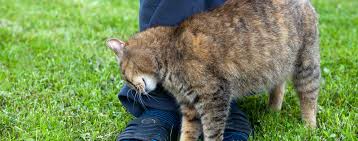Cats are known to be fickle creatures that don’t immediately grant their trust in people. It can sometimes require months to years of relationship building between kitty and pet parent to form a mutually faithful bond.
Once this bond is established, you’ll still need to understand cat body language to know what your cat is telling you. Cats often interact using covert signals, including eye blinking, tail movements, and rubbing against other animals or humans for social interaction.
Here’s what this interesting cat behavior really means.
What Does It Mean When a Cat Rubs Against You?
Cats have scent glands around their cheeks, chin, top of their head, and base of their tail. These scent glands contain pheromones. When cats rub their face or tail against humans, other animals, or household items, they are leaving behind this pheromone that they can identify.
Rubbing behavior is learned and passed down from mother to kitten. Rubbing and headbutting in the cat community are usually signs of marking territory, acceptance into the group, and/or greetings and adoration. Rubbing against something can also be used to gain information, as cats rely heavily on their sense of smell.
If your cat decides that they want to leave their pheromone on you, it should be considered a badge of honor, as it is one step closer to being accepted into their feline world.
However, it is necessary to make sure that the rubbing does not become compulsive and is not linked with abnormal behavior, as this can sometimes be related to medical issues.
Greetings
Most of the time, a cat rubbing their head or body against your leg is a very good sign. This is often a sign of greetings, meaning your cat is happy to see you. You may notice this more when you’ve been gone for a longer time.
Claiming You Through Scent
Not only is rubbing against you a sign of a happy “hello” or “welcome home,” but cats also want to make sure that they have marked you with their scent. Cats are territorial creatures and will claim their pet parents as part of their territory.
When a cat rubs against something, they are forming an affiliation with that person, animal, or item. In other words, they are accepting it into their environment and claiming it as their own.
Cats mark their territory intermittently, especially on objects in their environment, as these scents do not last forever and need to be “reapplied” for a cat to feel calm in their surroundings.
Once you come home from being out in the world, your cat’s personal scent has left you. So they want to mark you again with their scent by rubbing, headbutting, licking, or even gently biting you. This allows your cat to reclaim their territory, and it’s thought to increase endorphins, which gives them a sense of calm, happiness, and safety.
Gathering Information
Sometimes cats will also rub their head against new humans in their environment and/or other animals when they are trying to “size them up” or collect information about this new interloper.
In this case, it doesn’t mean that the cat wants the human or other animal to touch or pet them, so it’s important to not mistake this cue as an invitation to start petting a cat you just met.
Creating a Group Scent
In cat colonies and/or with feral cats, they often rub against each other to leave their pheromones on the group. This creates a communal scent, which helps identify intruders and promotes peace within the group.
Cats can associate other cat pheromone smells with mating, aggression, and health status, which helps them navigate the hierarchy of their colony.
Telling You They Need Something
We often wish our cats could talk to us to tell us what they need. Cats do communicate in their own way; they will often use rubbing, headbutting, and sometimes gentle biting as a sign of need.
If your cat is rubbing against the cabinet that contains their food/treats, it is likely that they are alerting you that they are hungry. Sometimes cats will aggressively rub against us to signal that something is wrong. This could be illness, or perhaps it’s a gentle reminder to clean out their litter box or that they need fresh water.
That’s why it is important to monitor and learn your cat’s behavioral prompts so you can understand when they need something from you.
Should I Worry If My Cat Is Rubbing Against Things All the Time?
If your cat suddenly begins aggressively rubbing against rugs, other objects, or even you, along with any other changes to their attitude or behavior, it’s a good idea to talk to your vet.
Be on the lookout for these sudden signs of illness:
Head tilt
Eye flicking
Confusion
Changes in appetite or drinking behavior
Increased vocalization
Weight loss
Vomiting
Diarrhea
Hair loss
Moderate to severe itching or overgrooming
Medical issues that can cause excessive rubbing (though your cat will almost always have other clinical signs, too) include:
Allergies
Fleas
Ear infections
Intracranial disease (tumors, infectious, or inflammatory causes)
Feline hypersensitivity disorder
If you notice that your cat is rubbing excessively, or you have any concerns about their behavior, schedule a visit with your veterinarian for evaluation and possible testing.

